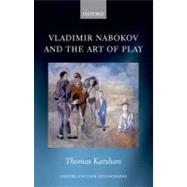Vladimir Nabokov and the Art of Play
, by Karshan, Thomas- ISBN: 9780199603985 | 0199603987
- Cover: Hardcover
- Copyright: 3/8/2011
In a speech given in December 1925, Vladimir Nabokov declared that 'everything in the world plays', including 'love, nature, the arts, and domestic puns.' All of Nabokov's novels contain scenes of games: chess, scrabble, cards, football, croquet, tennis, and boxing, the play of light and the play of thought, the play of language, of forms, and of ideas, children's games, cruel games of exploitation, and erotic play. Thomas Karshan argues that play is Nabokov's signature theme, and that Nabokov's novels form one of the most sophisticated treatments of play ever achieved. He traces the idea of art as play back to German aesthetics, and shows how Nabokov's aesthetic outlook was formed by various Russian emigre writers who espoused those aesthetics. Karshan then follows Nabokov's exploration of play as subject and style through his whole oeuvre, outlining the relation of play to other important themes such as faith, make-believe, violence, freedom, order, work, Marxism, desire, childhood, art, and scholarship. As he does so, he demonstrates a series of new literary sources, contexts, and parallels for Nabokov's writing, in writers as diverse as Kant, Schiller, Nietzsche, Pushkin, Dostoyevsky, Bely, the Joyce ofFinnegans Wake, Pope, and the humanist tradition of the literary game. Drawing in detail on Nabokov's untranslated early essays and poems, and on highly restricted archival material,Vladimir Nabokov and the Art of Playprovides the fullest scholarly-critical reading of Nabokov to date, and defines the ludic aspect of his work that has been such a vital example for, and influence on, contemporary writers, from Orhan Pamuk, W. G. Sebald, and Georges Perec, to John Updike, Martin Amis, and Tom Stoppard. Through Nabokov, it addresses the literary game-playing that is one of the most distinctive elements in post-1945 literature.







